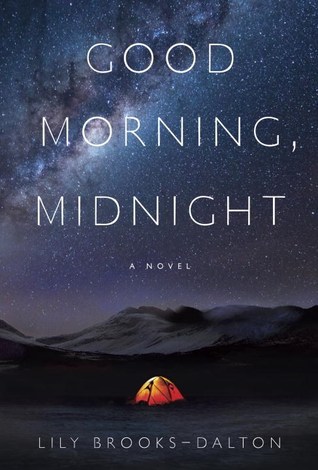Review: Lily Brooks-Dalton’s “Good Morning, Midnight”
by Miles Raymer

Lily Brooks-Dalton’s Good Morning, Midnight was the perfect book to wrap up a tough and tumultuous year. This short, dazzling novel is a mournful but energetic meditation on humanity’s struggle to find meaning and connection in a vast and threat-strewn universe.
Brooks-Dalton’s narrative toggles back and forth between two plot threads, both set against the ominous backdrop of an unexplained apocalypse. At a remote, snow-covered observatory, an aging researcher refuses to evacuate and settles down to die amidst the austerely beautiful skies and landscapes of the Arctic Circle. Half a solar system away, the six-member crew of the spaceship Aether finishes a survey of Jupiter’s moons and heads for home, only to discover that Mission Control and every other communication from Earth has gone suddenly silent.
Good Morning, Midnight is a simultaneously predictable and unconventional story about the end of the world. This gives it a nice balance between freshness and familiarity as the not-so-exciting plot progresses. It doesn’t matter that not much happens, because Brooks-Dalton’s writing is exceptional. The book is replete with gorgeous, thought-provoking passages on the nature of science, the universe, memory, family, regret, loneliness, and love. Here are a few of my favorites:
A wave of quiet reverence had overtaken the crew as they contemplated the four Galilean moons. A spiritual pause. The tension that had led them into deep space––the anxiety that perhaps the mission was beyond them, that they would fail and never be heard from again––evaporated. It was done. They had succeeded. Sully and her colleagues had become the first human beings to delve this deep into space, but more than that: Jupiter and her moons had changed them. Soothed them. Showed them how tiny, how exquisite, how inconsequential they really were. It was as though the six members of Aether‘s crew had been awakened from the small, insignificant dreams that constituted life on Earth. They could no longer relate to their own history, their own memories. When they arrived at Jupiter, an unfamiliar layer of their consciousness overflowed. It was as if the light had been turned on in a dark room and revealed infinity, sitting naked and glorious beneath the swinging bulb. (25)
We study the universe in order to know, yet in the end the only thing we truly know is that all things end––all but death and time. It’s difficult to be reminded of that…but it’s harder to forget. (69, emphasis hers)
He couldn’t say aloud, even now, at the end of the world, that he was lonely. That he craved connection without understanding how to obtain it; that finding a set of tracks, the merest evidence of another presence, was his idea of company. It went beyond the isolation of his situation, it was a part of him, and she suspected it always had been. Even in crowded rooms, even in busy cities, even in the arms of a lover, he was alone. She recognized it in him because it was in her too. (230-1)
This last passage, and the novel as a whole, captures the paradox of human intersubjectivity with unusual clarity. How can any of us––each unquestionably isolated in the universe of our own minds––ever truly make contact with another person? How is it that we also feel the supernova of recognition rising deep within us, insisting with brute force that we are not alone? This contradiction, Brooks-Dalton teaches us, is sewn into the fabric of our very being; it is a fundamental feature of the cosmic web of connections we traverse but scarcely comprehend.
Good Morning, Midnight is a poignant eulogy for a flawed, ambitious species whose moment in the sun was passionate and brief. Courageously, the book is neither cynical nor nihilistic––not even for an instant. “Even the fleeting things,” Brooks-Dalton reminds us, “were worth their weight in sadness. Even a few words could mean something” (249).
Rating: 10/10
[…] the end of 2020, I was captivated by Lily Brooks-Dalton’s Good Morning, Midnight. So I was excited this year when my wife suggested listening to The Light […]